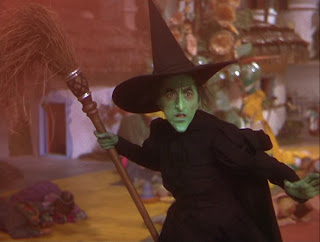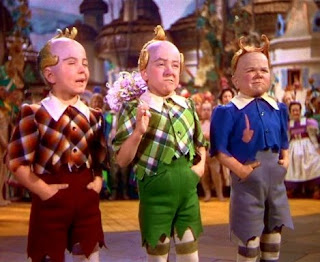- Why Nietzsche was not a nihilist and why you are forever trapped in the Wizard of Oz (part one)
- Why Nietzsche was not a nihilist and why you are forever trapped in the Wizard of Oz (part two)
- Why Nietzsche was not a nihilist and why you are forever trapped in the Wizard of Oz (part three)
Nietzsche's perspective: Someone has to be the next Wizard of Oz and it might as well be one of us
Winston Churchill said that democracy is the worst form of government we could possibly have, except for all the others we have tried. This sums up what Nietzsche might say if he discovers that there are no more wizards behind the curtain in the Land of Oz. The next wizard would have to be less bad than the previous ones we had. In other words, any wizard different from previously flawed wizards would suffice. This explains Nietzsche's adversity to the Wizard of old, namely Christianity, and his adversity to the Wizards of his day, namely nihilism, nationalism and anti-semitism. But let's have the man speak for himself:
Nietzsche's methods: His practice of war
“My practice of war is formulated in four principles:
- ...I only attack causes that are victorious...
- ...I only attack causes against which I would find no allies, so that I stand alone...
- ...I never attack persons...
- ..I only attack things when all personal differences are excluded, when any background of bad experiences is lacking. On the contrary, to attack is to me a proof of goodwill, sometimes even of gratitude...”
This is taken from Ecce Homo, Nietzsche's sarcastic review of his own life and his own works.

The Wicked Witch of the West. Prime exponent of master morality. One example of perspectivism.
Nietzsche: The Toto of the yellow brick road.
Critics of Nietzsche claim that his philosophy has no purpose and that he is without conviction. This proves to be inaccurate when one considers common themes in his philosophy.
- The opposition of Apollonian and Dionysian impulses in art: The Greek gods Apollo and Dionysus represent a struggle between order and chaos in art. While they were not rivals in the classical mythology sense, their aspects are thought to be in conflict in works of art. Apollo represents order, stability and harmony. Dionysus represents primal nature, chaos, ecstasy and intoxication. In short, Apollo represents the perspiration and Dionysus represents the inspiration.
- The will to power: Darwin postulated that only the fittest survive, and evolution is the process of determining which physical characteristics are most desirable to enable the fittest to survive. It is thus the strong that rule the weak. With regards to Schopenhauer's will to live: those with a stronger will to live, survive those with a weaker will to live.
Nietzsche claimed that the weak rule the strong (the meek shall inherit the earth, as it were), because the process of evolution serves to strengthen the weak and weed out the strong. Nietzsche claimed the will to power overrides even the will for survival. In other words, a will to power could even cause an organism to sacrifice its own life for a cause, thus contradicting that survival in the Darwinian sense is its ultimate cause.
Recent discoveries in biology such as genetic drift affirm that survival of the fittest only becomes the overwhelming criterion when the survival of a species is threatened. In the absence of immediate threats to survival, genetic drift largely determines physical characteristics. Nietzsche's will to power is an attempt to explain why members of a society carry on growing and establish a hierarchy, despite the absence of a threat to their survival and by extension, despite an apparent purpose. In terms of the Wizard of Oz, each member of Dorothy's company had a different reason for going to see the Wizard, and none of these reasons were survival. Each of them exhibited a will to power. - Slave morality and master morality: To Nietzsche, master morality weighs actions according to their consequences. The essence of master morality is nobility. Slave morality weighs actions according to their intentions. The essence of slave morality is utility. Morality in this sense suggests certain codes and norms of a society. Masters of a society establish these norms by considering consequences. Slaves of a society evaluate what the masters establish, in other words they affirm or reject the values established by stronger willed members. Slave morality and master morality are in conflict to create a moral middle ground. Dorothy represents master morality in the Wizard of Oz, and her companions are evaluating her intentions. When they find her motives to be in harmony with theirs, they accompany her on her journey down the yellow brick road.
- The claim that God is dead: Because of the advent of nihilism, God (capitalised, to indicate the Judeo-Christian conception of god) is dead because He is no longer considered a valid source of objective morality nor a cause of existence. In other words, Dorothy and her friends arrive in the Emerald City and they find that the wizard is an old man behind the curtain pulling levers. The wizard of Oz as they understood it is dead. For all intents and purposes, their god is dead.
- Radical perspectivism: Nietzsche claimed that all ideas originate from a particular perspective. There are many perspectives, and thus many different truths, but not all truths are equally valid or equally sound. Dorothy's perspective is that the wizard of Oz knows how to send her back to Kansas. The Wicked Witch of the West's perspective is that Dorothy represents a threat to the reign of terror, and Dorothy had to be eliminated. Dorothy's perspective was valid, considering her source of information, but not sound. The Wicked Witch of the West did have a valid and sound argument. From our perspective, she is a Wicked Witch because she interferes with Dorothy's plans to get back to Kansas. From her perspective, Dorothy threatens the moral fibre, because the Munchkins are not hapless slaves any longer.

Munchkins. Prime exponents of slave morality. Übermenschen, not so much.
It is clear that Nietzsche's philosophy did have meaning. To put it succinctly, since Nietzsche's philosophy had meaning, he could not have been a nihilist. For the more elaborate version, see the third part of his series.


No comments:
Post a Comment